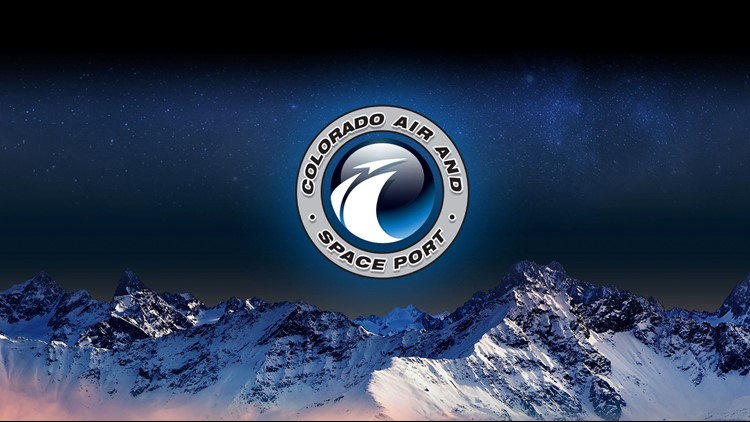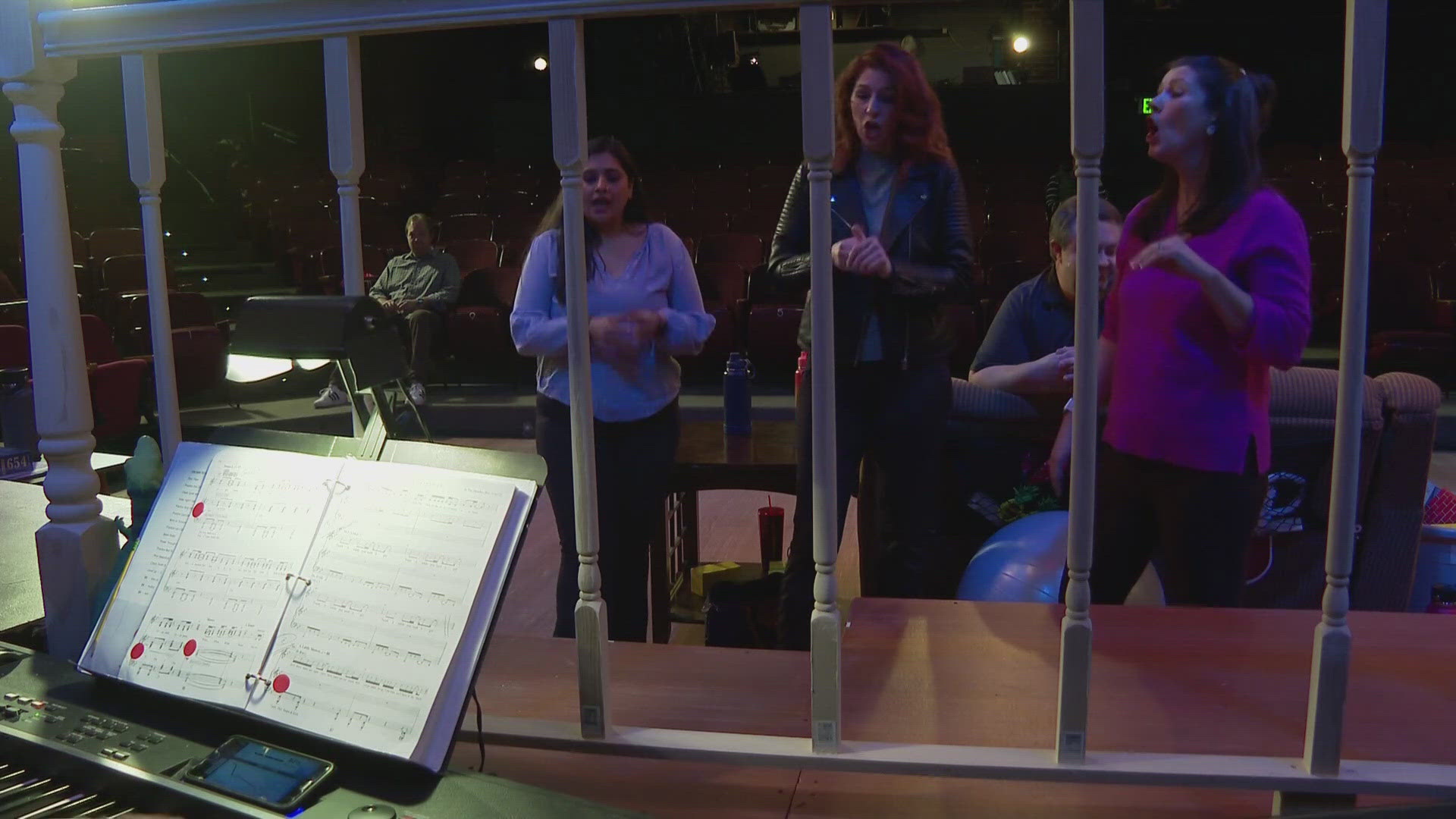The story of Colorado Air and Space Port is not so much about commercial space travel right now as it is a legitimizing force for the aerospace industry in Colorado.
What was formerly known as Front Range Airport will become a spaceport. This comes six months after the application Adams County government submitted to the Federal Aviation Administration back in February for a spaceport site operating license was approved.
The announcement came down on Friday, and the hopes of many to soon 'blast off' seems to have -- pardon the term -- skyrocketed.
But staffers at the newly christened Colorado Air and Space Port put the brakes on that kind of celebration at a press conference Monday morning at the new port. The message from Barry Gore, the director of Adams County Economic Development, was that this announcement further legitimizes Colorado as an aerospace powerhouse. He did not put out the rallying cry for any space explorers.
Gore said he's been on board will getting Colorado a spaceport since he first heard the word and praised the fact that the state's first spaceport was so close to the state's largest international airport.
A look at the atmosphere around the country
In 2011, the Adams County government and Gov. John Hickenlooper got the ball rolling on Colorado getting its own spaceport, becoming the 11th such facility in the country.
The Kennedy Space Center in Florida and the one at Vandenberg Air Force Base in Colorado are two other, better known, spaceports. There's also a spaceport on Kodiak Island in Alaska and one propped up by Richard Branson's Virgin Galactic in New Mexico.
Spaceport America, as it's called now, cost $209 million of taxpayer money to build in a rural part of the state -- about 89 miles north of El Paso and 20 miles southeast of the town of Truth or Consequences.
Virgin Galactic, the only company still in operation to have sold tickets to space -- at up to $250,000 a pop -- signed a 20-year lease with the spaceport. But after a tragic accident in 2013 that left one astronaut dead and another injured, Galactic still hasn't sent any tourists to space.
Colorado Air and Space Port is different.
Formerly Front Range Airport
Front Range Airport wasn't built from the ground up. The airport, on the eastern edge of Aurora, was built in 1984 and sits just six miles from Denver International Airport. It's been the focus of Colorado's attempts to get a spaceport since Hickenlooper first joined the push in 2011.
According to Adams County government spokesperson Jim Siedlecki, the airport already has two 8,000-foot runways. It's already built and operating. Small planes fly in and out every day - and that's not about to change.
The license means Colorado is wrapping its arms around the industry, Siedlecki said. It provides for the 400 aerospace companies researching and testing products for all kinds of space commerce - including space mining.
The Colorado School of Mines announced last week that they were offering Master's and Ph.D.-level coursework in space mining. (We're talking mining asteroids and the moon here.)
Gore, Adams County's economic development director, said Monday that the port provides not only aerospace legitimacy to Adams County but all of Colorado. The Centennial State is one of just a few states to have a spaceport.
"This new facility adds capabilities to Colorado that we haven't had before, and so when companies evaluate us against other aerospace states and cities, we want to be able to tell them you can launch here," he said.
Now, Gore can - except there's one caveat.
Specific to Colorado Air and Space Port
The FAA license does not allow for vertical takeoff. 9NEWS has questions into Adams County regarding their potential future interest in allowing for vertical takeoffs. (We'll update this story when we hear back.)
In the meantime, the port allows for vertical takeoff - like standard planes - that then use rockets to enter suborbital space. Suborbital space means entering Earth's orbit, but not completing a full "orbital revolution." That means a craft that enters space but returns to Earth prior to going around the planet is a suborbital flight.
These flights would take off from Colorado Air and Space Port and would be the flights. A person could, for example, that a flight from Aurora all the way to Tokyo, Japan in the timeframe of one in-flight movie.
But Gore said that is many years off. For now, he said, Coloradans can expect a lot of research getting down at Colorado Air and Space Port.
"[Companies] will be doing research, small payload launches" and eventually tourism, he said.
Broad bipartisan support
The push to get a spaceport in Colorado has been bipartisan. Both of Colorado's U.S. senators signed onto the letter urging the FAA to give them their "full, fair and swift cooperation." Besides Sens. Cory Gardner (R) and Michael Bennet (D), all congresspersons from Colorado signed on as well, except Ken Buck out of Greeley.
Congressmen Mike Coffman (R-Aurora) and Ed Perlmutter (D-Lakewood) were on hand to speak Monday. Coffman thanked the local representatives for their unwavering support of the project. He credited them with making the spaceport there a reality.
Perlmutter was visibly excited over the news. "This is a big first step," he said. "But obviously there are many more to come."
He said one reason the commercial space industry is so important to Colorado is that it could be easily paired with the state's already numerous aerospace industries and higher-learning institutions.
Their pushing eventually worked. Almost six months to the day of submitting the request, the FAA announced Colorado Air and Space Port would be the United States' next avenue to the stars on Friday.
Part of the county and statewide push for the Front Range Airport specifically was the option for growth. According to Siedlecki, while a lot of necessary infrastructure is already at the airport, the 7,000 acres of industrial property around the airport provides for the possibility of future growth.
The opposition
The launch zone is a sparsely populated area on the Plains - 50 miles by 100 miles with a few small towns and plenty of agricultural land. There are concerns about crop dusting and Flight for Life being restricted during weekly launches, says former Republican State Sen. Greg Brophy, of Wray.
Brophy says some neighbors feel they haven't been included in the process. They want a town hall meeting with the space flight companies before moving forward.
Brophy does say that even he'd be hard-pressed to find an area with fewer people, but the people there want to know all the concerns before this program starts in their neighborhood.
"It's probably under a thousand (people)," he said. "The people that happen to live out there like my friend Mike or my cousin Dina - they look at this and they say, 'Okay, we get it. There's not many of us out here, but there's some of us, and we count, too.' And they don't feel like people on the Front Range believe that they count."



